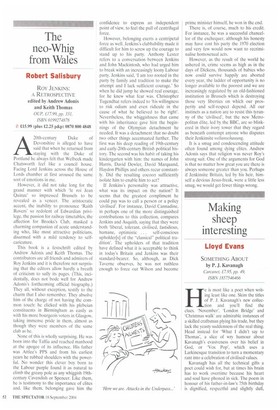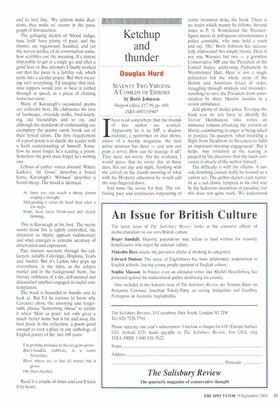Making sheep interesting
Lloyd Evans
SOMETHING ABOUT by P. J. Kavanagh Carcanet, £7.95, pp. 49, ISBN 1857546466 He is most like a poet when writing least like one. Skim the titles of P. J. Kavanagh's new collection and you'll find the clues. 'November', 'London Bridge' and 'Christmas walk' are admirable instances of a skilled craftsman plying his trade, but they lack the yeasty suddenness of the real thing. Head instead for 'What I didn't say to Thomas', a slice of wry humour about Kavanagh's evasiveness over his belief in God, or 'Vox Pop', which uses a Larkinesque transition to turn a momentary rant into a celebration of civilised values.
Kavanagh has all the technical gifts a poet could wish for, but at times his brain has to work overtime because his heart and soul have phoned in sick. The poem in honour of his father-in-law's 75th birthday is dignified, respectful and slightly dull, and its best line, 'We seldom make decisions, they make us' occurs in the paragraph of introduction, The galloping dactyls of 'Mood indigo, tune Irish' have plenty of pace, and the rhymes are ingeniously handled, and yet the woven artifice of its construction somehow scribbles out the meaning. It's almost impossible to get at a single go, and after a good four or five attempts I finally worked out that the piece is a fertility ode which turns into a secular prayer. But then meaning isn't everything. I'd imagine that bedtime nippers would love to hear it rattled through at speed, as a piece of chiming nonsense-verse, Many of Kavanagh's occasional poems are collected here. He elaborates his love of landscape, riverside walks, bird-watching, old friendships and so on, and although the standards of craftmanship are exemplary the poems rarely break out of their lyrical idiom. The first requirement of a good poem is to dazzle the reader with a fresh understanding of himself. Somehow he must forget he's reading a poem. Somehow the poet must forget he's writing one.
Echoes of earlier voices abound, Where Larkin's 'At Grass' describes a bored horse, Kavanagh's Whitsun' describes a bored sheep. The mood is identical.
At times you can watch a sheep almost shaping a thought, Mid-grazing it raises its head then takes a few steps, Stops, head erect, blank-eyed and clearly thinking.
This is Kavanagh at his best. The metre seems loose but is tightly controlled, the attention to rhyme appears rudimentary and what emerges is extreme accuracy of observation and expression.
Past masters resonate through the collection, notably Coleridge, Hopkins, Yeats and Auden. But it's Larkin who pops up everywhere, in the titles, in the subject matter and in the background 'hum', the literary ambience of a shy, self-assured and dissatisfied intellect engaged in rueful contemplation.
The book is beautiful to handle and to look at. But I'd be curious to know why Carcanet chose the annoying and forgettable phrase 'Something About' to entitle it when 'Slow as grass' not only gives a much better name but is far and away the best piece in the collection, a poem good enough to earn a place in any anthology of English poetry of the last 100 years:
I'm growing patience as the cut grass grows Blunt-headed, stubborn, in a warm November.
Blunt where cut to last all winter but it grows On, blunt-headed.
Read it a couple of times and you'll have it by heart.



















































































 Previous page
Previous page